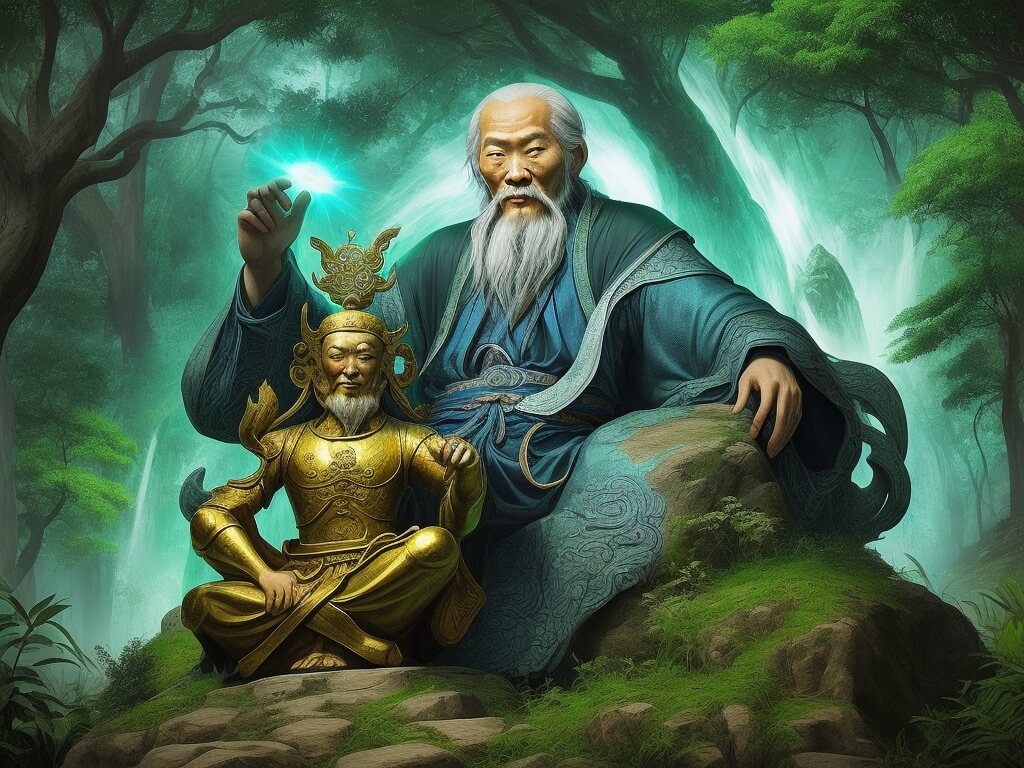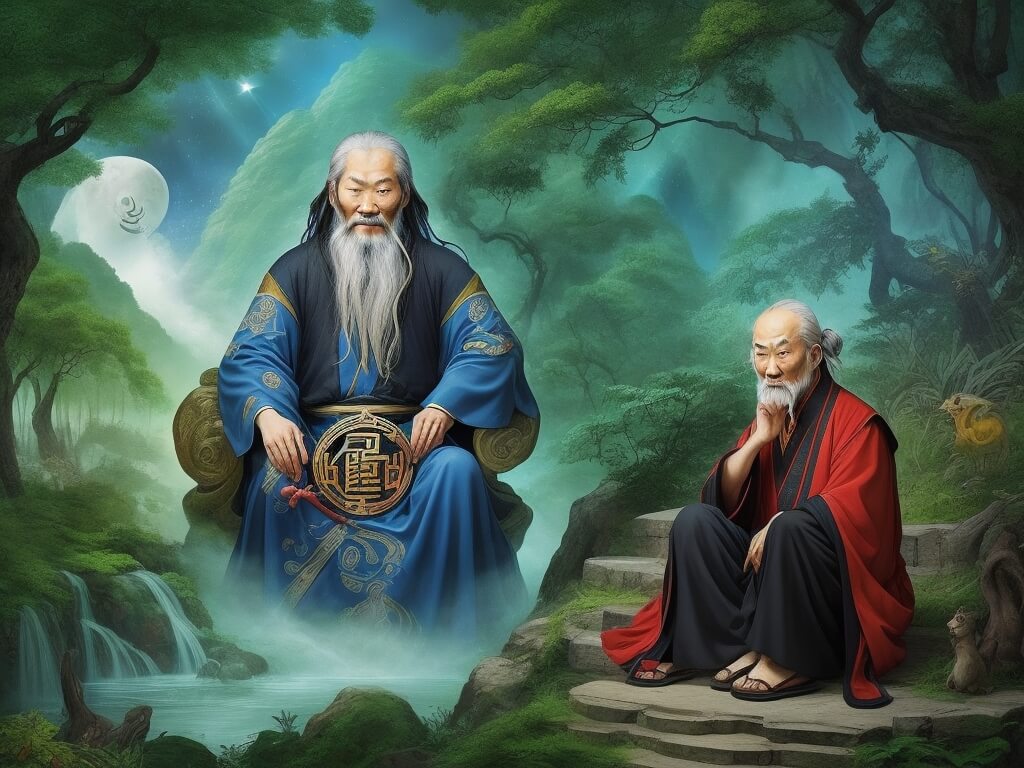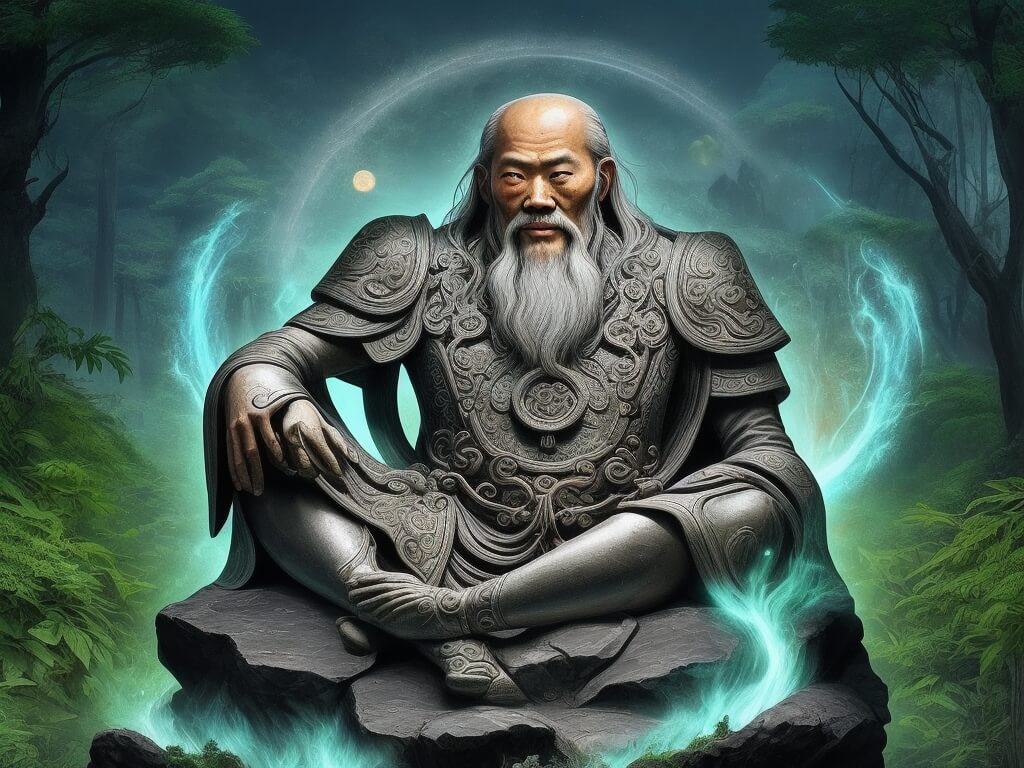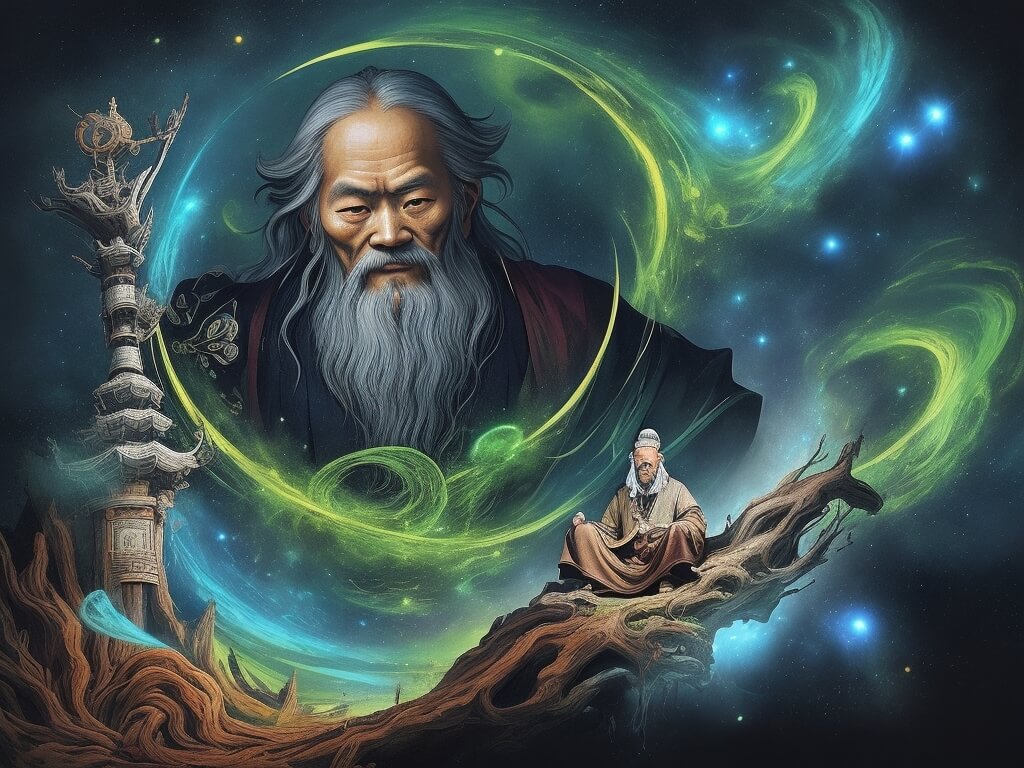Explore the timeless teachings of Laozi (Lao Tzu) and the philosophy of Taoism. Discover the relevance of Laozi’s wisdom in today’s world, from stress reduction and personal development to leadership and environmental sustainability.

Laozi, also spelled as Lao Tzu or Lao Tze, is a legendary figure in Chinese philosophy and is traditionally considered the author of the “Tao Te Ching” (or “Daodejing”), one of the foundational texts of Daoism (Taoism). However, it’s important to note that the historical existence of Laozi is still a subject of debate among scholars, and many consider him to be a semi-legendary or mythical figure.
The philosophical tradition associated with Laozi is Daoism (Taoism). The core concept of Daoism revolves around the idea of the “Dao” (Tao), which can be roughly translated as “The Way” or “The Path.” The Dao is an underlying principle or force that is both the source and the destination of everything in the universe. It is formless, ever-changing, and cannot be directly described or understood through language or rational thought.
Laozi’s “Tao Te Ching” is a short text that consists of 81 chapters (or verses) and serves as a guide to living in harmony with the Dao. It emphasizes simplicity, spontaneity, and the importance of aligning oneself with the natural flow of life. Some key ideas and themes associated with Laozi and Daoism include:
- Wu Wei: This concept can be translated as “non-action” or “effortless action.” It suggests that one should act in accordance with the Dao, allowing events to unfold naturally without forcing or manipulating them.
- Yin and Yang: Daoism recognizes the duality and interdependence of opposites, symbolized by the concept of Yin and Yang. These opposing forces are seen as complementary and interconnected aspects of the Dao.
- Simplicity and Humility: Daoism advocates for a simple and humble way of life, valuing inner contentment over material wealth and status.
- Naturalness: Daoists seek to return to a more natural state of being, aligning themselves with the rhythms of nature and avoiding unnecessary complexity and artificiality.
- Detachment: Daoism encourages detachment from desires and worldly pursuits, emphasizing the importance of inner peace and tranquility.
Laozi’s teachings have had a profound influence on Chinese culture, including philosophy, religion, and traditional Chinese medicine. Daoism has also had a significant impact on various aspects of East Asian culture and thought. It is important to note that there are different branches and interpretations of Daoism, ranging from philosophical Daoism to religious Daoism, and these can sometimes have distinct beliefs and practices.

What is the Tao Te Ching, and what do we know about this book, considered Lao Tzu’s most important work?
The “Tao Te Ching” (or “Daodejing”) is a fundamental and highly influential text in Chinese philosophy and culture. It is traditionally attributed to Laozi (Lao Tzu), although the historical existence of Laozi and the exact authorship of the text are subjects of debate among scholars. Regardless of its authorship, the “Tao Te Ching” is considered Laozi’s most important work and is a foundational text of Daoism (Taoism).
Here are some key points about the “Tao Te Ching”:
- Structure: The “Tao Te Ching” is a relatively short text consisting of 81 chapters, often referred to as verses or chapters, which are written in poetic and aphoristic style. These verses are concise and filled with profound wisdom.
- Themes: The central theme of the “Tao Te Ching” is the concept of the “Tao” (Tao or Dao), which can be translated as “The Way” or “The Path.” The text explores the nature of the Tao and offers guidance on how individuals can align themselves with it to live a harmonious and balanced life.
- Philosophical Concepts: Within its verses, the “Tao Te Ching” introduces various key concepts of Daoist philosophy, including:
- Wu Wei: The idea of “non-action” or “effortless action,” where one acts in harmony with the natural flow of the Tao, avoiding unnecessary interference or force.
- Yin and Yang: The text discusses the interplay of opposites, represented by Yin and Yang, and how they are interconnected in the dynamic balance of the Tao.
- Simplicity and Humility: It emphasizes the value of leading a simple and humble life, free from excess and ego.
- Detachment and Non-Attachment: The “Tao Te Ching” encourages detachment from desires and worldly pursuits, promoting inner contentment and peace.
- Influence: The “Tao Te Ching” has had a profound impact not only on Daoism but also on Chinese culture, philosophy, and various other fields. Its teachings have been incorporated into traditional Chinese medicine, martial arts, and the arts.
- Translations and Interpretations: The “Tao Te Ching” has been translated into numerous languages and has inspired countless interpretations and commentaries over the centuries. Different translators may render its verses differently, leading to a variety of interpretations.
Overall, the “Tao Te Ching” is a timeless philosophical text that continues to be studied and cherished for its insights into the nature of existence, the human condition, and the path to a balanced and harmonious life. It offers guidance on how to live in accordance with the Dao, embracing the natural order of things.

What historical sources do we have about Lao Tzu’s life and teachings?
The historical sources and information about Laozi’s life and teachings are quite limited, and there is considerable debate and uncertainty surrounding this legendary figure. Laozi is traditionally considered the author of the “Tao Te Ching,” but the historical accuracy of this attribution remains a subject of scholarly inquiry. Here’s what we know and what we don’t know about Laozi:
What We Know:
- Laozi’s Name: “Laozi” is not a personal name but rather a title or honorific, which can be translated as “Old Master” or “Old Teacher.” The actual name of the person traditionally associated with Laozi is not known.
- Historical Existence: The historical existence of Laozi is uncertain, and he is often regarded as a semi-legendary or mythical figure. The lack of concrete historical records or contemporary accounts makes it challenging to verify his existence.
- Authorship of the “Tao Te Ching”: Laozi is traditionally credited with writing the “Tao Te Ching,” a foundational text of Daoism. However, the authorship of this text is debated, and some scholars argue that it may have been compiled and edited by multiple authors over time.
- Time Period: If Laozi did exist, he is generally believed to have lived in ancient China during the late 6th century BCE, though this is also a matter of debate.
What We Don’t Know:
- Biographical Details: Very little is known about Laozi’s personal life, including his birthplace, family, or specific historical events associated with his life.
- Authenticity of the “Tao Te Ching”: As mentioned earlier, the authorship of the “Tao Te Ching” remains a topic of debate. Some scholars believe it may have been composed by multiple authors over a period of time, and the text itself is filled with layers of allegory and symbolism.
- Teachings and Influence: While the “Tao Te Ching” is attributed to Laozi and contains his philosophical ideas, it is challenging to separate his specific teachings from later interpretations and commentaries. The text has been subject to a wide range of interpretations and adaptations throughout history.
- Historical Records: There are no contemporaneous historical records or writings that definitively confirm Laozi’s existence or provide detailed information about his life and teachings.
In summary, Laozi remains an enigmatic figure in Chinese history and philosophy. While he is traditionally regarded as the author of the “Tao Te Ching” and is associated with the development of Daoism, the historical details about his life are shrouded in mystery, and much of what is known about him is based on legend, myth, and later interpretations of his work.

What is the relationship between Lao Tzu and Taoism, and what are the core principles of this philosophical movement?
Laozi (Lao Tzu) is traditionally considered one of the key figures associated with the development of Taoism (or Daoism). While the historical existence of Laozi is still a subject of debate, his legendary status as the author of the “Tao Te Ching” and his association with Taoism have had a profound influence on the philosophy and practices of Taoism. Here’s an overview of the relationship between Laozi and Taoism, as well as the core principles of this philosophical movement:
1. Laozi and Taoism:
- Laozi is often regarded as the founder or central figure of Taoism, a philosophical and spiritual tradition that emerged in ancient China.
- The “Tao Te Ching,” attributed to Laozi, is one of the foundational texts of Taoism and provides key insights into the philosophy’s principles and practices.
2. Core Principles of Taoism:
- The Tao (Dao): At the heart of Taoism is the concept of the Tao, which can be translated as “The Way” or “The Path.” The Tao is the fundamental principle that underlies and unifies everything in the universe. It is formless, ever-changing, and beyond direct description.
- Wu Wei: Wu Wei is often translated as “non-action” or “effortless action.” It is the principle of aligning one’s actions with the natural flow of the Tao, allowing events to unfold naturally without excessive force or interference. It involves acting spontaneously, without striving or trying to control outcomes.
- Yin and Yang: Taoism recognizes the duality and interdependence of opposites, symbolized by the concepts of Yin and Yang. These opposing forces are seen as complementary and interconnected aspects of the Tao. Balancing and harmonizing Yin and Yang is essential for achieving equilibrium.
- Simplicity and Humility: Taoist philosophy encourages a simple and humble way of life. It emphasizes the value of inner contentment and the avoidance of excess, materialism, and ego.
- Detachment: Taoism teaches detachment from desires, attachments, and worldly pursuits. By letting go of cravings and attachments, individuals can find inner peace and harmony.
- Naturalness: Taoists seek to return to a more natural state of being, aligning themselves with the rhythms of nature and avoiding unnecessary complexity and artificiality.
- Spontaneity: The Taoist ideal is to act spontaneously and intuitively, without overthinking or planning. This is closely related to the concept of Wu Wei.
- Mysticism and Meditation: Taoism includes mystical practices and meditation techniques aimed at attaining a direct experience of the Tao and achieving spiritual enlightenment.
Taoism can be divided into philosophical Taoism (focused on principles and personal development) and religious Taoism (which incorporates rituals, deities, and religious practices). Philosophical Taoism is often associated with Laozi’s teachings in the “Tao Te Ching,” while religious Taoism involves a more complex and multifaceted system of beliefs and practices.
Overall, Taoism encourages individuals to live in harmony with the Tao and the natural order of the universe, seeking balance, simplicity, and inner peace in their lives. It has had a lasting impact on Chinese culture, influencing not only philosophy and spirituality but also art, medicine, and various aspects of daily life.
Are Lao Tzu’s teachings still relevant today, and how are they interpreted?
Laozi’s teachings, as presented in the “Tao Te Ching” and the broader philosophy of Taoism, continue to be relevant and influential in the modern world. Many people find value in Laozi’s wisdom and principles, and his teachings are interpreted and applied in various ways today. Here are some reasons why Laozi’s teachings remain relevant and how they are interpreted:
1. Universal Wisdom: Laozi’s teachings touch on timeless and universal themes such as the nature of existence, human behavior, ethics, and the pursuit of a balanced and meaningful life. These themes are still applicable to contemporary life and resonate with people seeking guidance and meaning.
2. Stress Reduction and Well-Being: The concept of Wu Wei (non-action or effortless action) and the emphasis on simplicity, humility, and detachment can help individuals reduce stress, improve mental health, and enhance overall well-being. In today’s fast-paced and often stressful world, these teachings offer valuable strategies for finding inner peace and balance.
3. Environmental Sustainability: Taoism’s emphasis on living in harmony with nature and the natural order has relevance in the context of environmental sustainability. Laozi’s teachings encourage respect for the environment and a more mindful and sustainable approach to life.
4. Leadership and Management: Laozi’s ideas on leadership and governance, as outlined in the “Tao Te Ching,” have been applied in leadership and management philosophy. Concepts like leading with humility, adapting to change, and allowing things to unfold naturally can inform effective leadership practices in modern organizations.
5. Personal Development: Many individuals turn to Laozi’s teachings for personal development and self-improvement. His emphasis on self-awareness, self-mastery, and inner transformation provides a valuable framework for personal growth.
6. Mindfulness and Meditation: The practice of mindfulness and meditation, which are rooted in Taoist and Buddhist traditions, has gained popularity in the modern world for their stress-reduction and mental clarity benefits. These practices draw on principles found in Laozi’s teachings.
7. Philosophical and Ethical Reflection: Laozi’s writings stimulate philosophical and ethical reflection. They encourage individuals to question their values, desires, and attachments, prompting a deeper understanding of oneself and the world.
8. Interfaith and Cross-Cultural Dialogue: Laozi’s philosophy has been a subject of interest in interfaith and cross-cultural dialogues. It offers insights that can complement and enrich discussions about spirituality, ethics, and the human experience.
Interpretations of Laozi’s teachings can vary widely, and individuals, scholars, and practitioners may approach his philosophy from different angles. Some may emphasize the philosophical aspects of Daoism, while others may engage with its spiritual or religious dimensions. Additionally, various contemporary authors and teachers have written books and given lectures on how to apply Laozi’s teachings in practical ways to navigate the challenges of modern life.
In summary, Laozi’s teachings remain relevant because they address fundamental aspects of human existence and provide valuable guidance for living a balanced, meaningful, and harmonious life in the present day. They continue to inspire and resonate with people from diverse backgrounds and cultures.